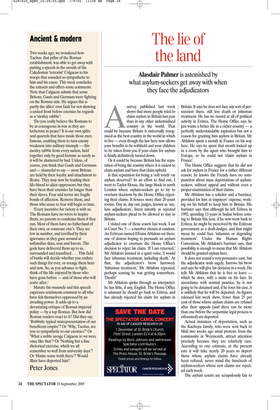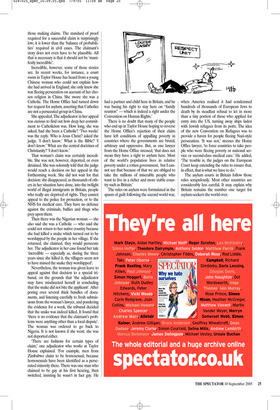The lie of the land
Alasdair Palmer is astonished by what asylum-seekers get away with when they face the adjudicators Asurvey published last week shows that more people tried to claim asylum in Britain last year than in any other industrialised country in the world. That could be because Britain is universally recognised as the best country in the world in which to live — even though the law here now allows your benefits to be withheld and your children to be taken from you if your claim for asylum is finally definitively turned down.
Or it could be because Britain has the reputation of being the country where it is easiest to claim asylum and have that claim upheld.
Is that reputation for being a ‘soft touch’ on asylum deserved? In an effort to find out, I went to Taylor House, the large block in north London where asylum-seekers go to try to overturn decisions by the Home Office rejecting their claims. It houses more than 20 court rooms. Day in, day out, judges, known as ‘asylum adjudicators’, listen intently as rejected asylum-seekers plead to be allowed to stay in Britain.
I visited one of those courts last week. I sat in Court No. 5 — a number chosen at random. An Eritrean named Efraim Ablalom sat there, one of dozens hoping to persuade an asylum adjudicator to overturn the Home Office’s decision to reject his claim. ‘If I am returned,’ Mr Ablalom insisted in a quiet voice, ‘I would face inhuman treatment, including death.’ At that, the adjudicator’s brow furrowed. ‘Inhuman treatment,’ Mr Ablalom repeated, perhaps sensing he was getting somewhere. ‘Death!’ Mr Ablalom spoke through an interpreter; he has little, if any, English. The Home Office is adamant he should go back to Eritrea, and has already rejected his claim for asylum in Britain. It says he does not face any sort of persecution there, still less death or inhuman treatment. He has no record at all of political activity in Eritrea. The Home Office says he just wants a better life in a richer country — a perfectly understandable aspiration but not a reason for granting him asylum in Britain. Mr Ablalom spent a month in France on his way here. He says he spent that month locked up in a room by the agent who brought him to Europe, so he could not ‘claim asylum in France’.
The Home Office suggests that he did not ask for asylum in France for a rather different reason; he knows the French have no compunction about mass deportations of asylumseekers, without appeal and without even a proper examination of their claims.
Mr Ablalom has a solicitor and a barrister, provided for him at taxpayers’ expense, working on his behalf to keep him in Britain. His barrister says that although he left Eritrea in 1992, spending 13 years in Sudan before coming to Britain this year, if he now went back to Eritrea, he might be perceived by the Eritrean government as a draft-dodger, and that might mean he could face ‘inhuman or degrading treatment’. Under the Human Rights Convention, Mr Ablalom’s barrister says, that possibility is enough to mean that Mr Ablalom should be granted asylum here.
It does not sound a very persuasive case, but the adjudicator nods sagely, furrows his brow and says he will give his decision in a week. He tells Mr Ablalom that he is free to leave which he does, with a smile on his face. In accordance with normal practice, he is not going to be detained and, if he loses his case, it is unlikely that he will be deported. As figures released last week show, fewer than 25 per cent of those whose asylum claims are refused after their appeals (and there can be more than one before the serpentine legal process is exhausted) are deported.
Actual instances of deportation, such as the Kachepa family, who were sent back to Mali two weeks ago amid protests from the community in Weymouth, attract attention precisely because they are relatively rare. According to one estimate, at the present rate it will take nearly 20 years to deport those whose asylum claims have already been refused, never mind the hundreds of asylum-seekers whose new claims are rejected each week.
The asylum courts are scrupulously fair to those making claims. The standard of proof required for a successful claim is surprisingly low; it is lower than the ‘balance of probabilities’ required in civil cases. The claimant’s story does not even have to be plausible. All that is necessary is that it should not be ‘manifestly incredible’.
Incredible, however, some of those stories are. In recent weeks, for instance, a court room in Taylor House has heard from a young Chinese woman who could not explain how she had arrived in England; she only knew she was fleeing persecution on account of her chosen religion in China. She swore she was a Catholic. The Home Office had turned down her request for asylum, asserting that Catholics are not a persecuted group in China.
She appealed. The adjudicator in her appeal was curious to find out how deep her commitment to Catholicism was. How long, she was asked, had she been a Catholic? ‘Two weeks’ was the reply. Who is Jesus Christ? asked the judge. ‘I don’t know.’ What is the Bible? ‘I don’t know.’ What are the central doctrines of Christianity? ‘I don’t know.’ That woman’s claim was certainly incredible. She was not, however, deported, or even detained. She was solemnly told that the judge would reach a decision on her appeal in the forthcoming week. She did not wait for that decision: she disappeared, as thousands of others in her situation have done, into the twilight world of illegal immigrants in Britain, people who really are deprived of rights. They cannot appeal to the police for protection, or to the NHS for medical care. They have no defence against the criminals, bullies and thugs who prey upon them.
Then there was the Nigerian woman — she also said she was a Catholic — who said she could not return to her native country because she had killed a snake which turned out to be worshipped by the people in her village. If she returned, she claimed, they would persecute her. The adjudicator in her case found her tale ‘incredible — especially as, during the three years since she killed it, the villagers seem not to have missed the snake they worshipped’.
Nevertheless, the woman was given leave to appeal against that decision to a special tribunal, on the grounds that ‘the adjudicator may have misdirected herself in concluding that the snake did not bite the applicant’. After poring over several thick bundles of documents, and listening carefully to fresh submissions from the woman’s lawyer, and pondering the evidence for a week, the tribunal decided that the snake was indeed killed. It found that ‘there is no evidence that the claimant’s problems were anything other than a local dispute’. The woman was ordered to go back to Nigeria. It is not known if she went; she was not deported either.
‘There are fashions for certain types of claim,’ one adjudicator who works at Taylor House explained. ‘For example, men from Zimbabwe claim to be homosexual, because homosexuals have been identified as a persecuted minority there. There was one man who claimed to be gay at his first hearing, then switched, insisting he wasn’t in fact gay. He had a partner and child here in Britain, and he was basing his right to stay here on “family reunion” — which is indeed a right under the Convention on Human Rights.’ There is no doubt that many of the people who end up in Taylor House hoping to reverse the Home Office’s rejection of their claim have left conditions of appalling poverty in countries where the governments are brutal, arbitrary and oppressive. But, as one lawyer from the Home Office stressed, ‘that does not mean they have a right to asylum here. Most of the world’s population lives in relative poverty under a rotten government, but I cannot see that because of that we are obliged to take the millions of miserable people who want to live in a richer and more stable country such as Britain.’ The rules on asylum were formulated in the spasm of guilt following the second world war, when America realised it had condemned hundreds of thousands of European Jews to death by its steadfast refusal to let in more than a tiny portion of those who applied for entry into the US, turning away ships laden with Jewish refugees from its ports. The idea of the new Convention on Refugees was to provide a haven for people fleeing Nazi-style persecution. ‘It was not,’ stresses the Home Office lawyer, ‘to force countries to take people who were fleeing poverty or national service or second-class medical care.’ He added, ‘The trouble is, the judges on the European Court keep extending the rules to ensure that, in effect, that is what we have to do.’ The asylum courts in Britain follow those rules scrupulously. Most other countries are considerably less careful. It may explain why Britain remains the number one target for asylum-seekers the world over.

























































 Previous page
Previous page